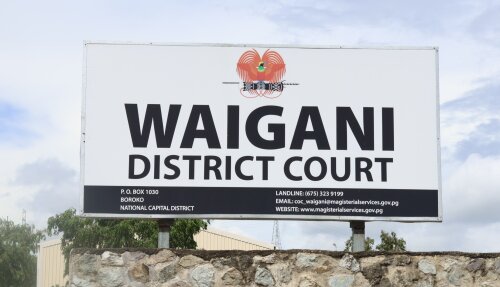Best Real Estate Lawyers in Papua New Guinea
Share your needs with us, get contacted by law firms.
Free. Takes 2 min.
Free Guide to Hiring a Real Estate Lawyer
Or refine your search by selecting a city:
List of the best lawyers in Papua New Guinea
About Real Estate Law in Papua New Guinea
Real Estate in Papua New Guinea is primarily governed by various land acts and customary land laws. The country possesses a dual land tenure system, comprising government or state-owned land and customary land owned by indigenous tribes. Each tenure system has its own unique regulations and procedures. Approximately 97% of the land is under customary ownership, which involves intricate customary laws and practices. This complexity can often make real estate transactions a challenging process, requiring careful navigation of legal frameworks and cultural practices.
Why You May Need a Lawyer
Engaging with real estate transactions in Papua New Guinea can present several challenges, making legal advice indispensable in many situations. Common scenarios requiring legal assistance include:
- Purchasing or Selling Property: Ensuring all legal requirements are met can prevent future disputes.
- Resolving Land Disputes: Customary land ownership can often lead to disagreements between parties.
- Leasing Agreements: Drafting or reviewing lease agreements to protect interests.
- Development Projects: Comprehending legal frameworks for commercial or residential developments.
- Title Searches: Verifying property ownership and clearing any encumbrances.
Local Laws Overview
The real estate legal framework in Papua New Guinea involves several critical components:
- Customary Land Laws: Governed by traditional laws and practices, making transactions on such land complex.
- Land Act 1996: Governs dealings in government-owned land.
- Physical Planning Act 1989: Provides for land use and development planning.
- Land Dispute Settlement Act 1975: Sets out a legal process for resolving land disputes.
- Environmental Regulations: Development projects must comply with environmental laws to prevent harm to ecosystems.
Frequently Asked Questions
What is the primary type of land ownership in Papua New Guinea?
Approximately 97% of the land is owned under customary land ownership, which is governed by traditional laws and practices.
Can foreigners own land in Papua New Guinea?
Foreigners cannot own customary land, but they may lease land for up to 99 years with approval from the relevant authorities.
What are the steps to buying property in Papua New Guinea?
Buying property typically involves negotiating terms, conducting a title search, drawing up a sales contract, and registering the transfer deed with local authorities.
How are land disputes resolved?
Land disputes are generally settled through the Land Dispute Settlement Act, which involves arbitration and adjudication by local land courts.
What taxes are associated with real estate transactions?
Property sales generally incur a stamp duty, which varies depending on the property's value.
What legal documents are necessary for leasing property?
A lease agreement, which clearly outlines tenants' and landlords' rights and responsibilities, is required.
Are there restrictions on land use in Papua New Guinea?
Land use is regulated by the Physical Planning Act, which dictates zoning and permissible developments.
What are the implications of environmental laws on real estate?
Environmental regulations require that any developments comply with national standards to reduce environmental impact.
How does title registration work?
Title registration involves officially recording who owns a property in government land registries, which is essential for proving legal ownership.
Is it necessary to do a title search before buying land?
Yes, conducting a title search is vital to ensure the seller legally owns the property and that there are no encumbrances or disputes.
Additional Resources
For further assistance or information, consider reaching out to the following resources:
- Department of Lands and Physical Planning: Responsible for land administration.
- The Law Society of Papua New Guinea: Offers legal advice and resources on property matters.
- Local Land Courts: Help with resolving disputes involving customary land.
- Environment and Conservation NGOs: Provide guidance on navigating environmental laws for development projects.
Next Steps
If you require legal assistance in real estate matters, it's crucial to engage with a qualified lawyer with expertise in Papua New Guinea's real estate laws. Start by contacting a law firm specializing in property law or reach out to the Law Society of Papua New Guinea for referrals. Preparing relevant documents and understanding your goals can improve the efficacy of your legal consultation.
Lawzana helps you find the best lawyers and law firms in Papua New Guinea through a curated and pre-screened list of qualified legal professionals. Our platform offers rankings and detailed profiles of attorneys and law firms, allowing you to compare based on practice areas, including Real Estate, experience, and client feedback.
Each profile includes a description of the firm's areas of practice, client reviews, team members and partners, year of establishment, spoken languages, office locations, contact information, social media presence, and any published articles or resources. Most firms on our platform speak English and are experienced in both local and international legal matters.
Get a quote from top-rated law firms in Papua New Guinea — quickly, securely, and without unnecessary hassle.
Disclaimer:
The information provided on this page is for general informational purposes only and does not constitute legal advice. While we strive to ensure the accuracy and relevance of the content, legal information may change over time, and interpretations of the law can vary. You should always consult with a qualified legal professional for advice specific to your situation.
We disclaim all liability for actions taken or not taken based on the content of this page. If you believe any information is incorrect or outdated, please contact us, and we will review and update it where appropriate.
Browse real estate law firms by service in Papua New Guinea
Papua New Guinea Attorneys in related practice areas.
Browse real estate law firms by city in Papua New Guinea
Refine your search by selecting a city.














